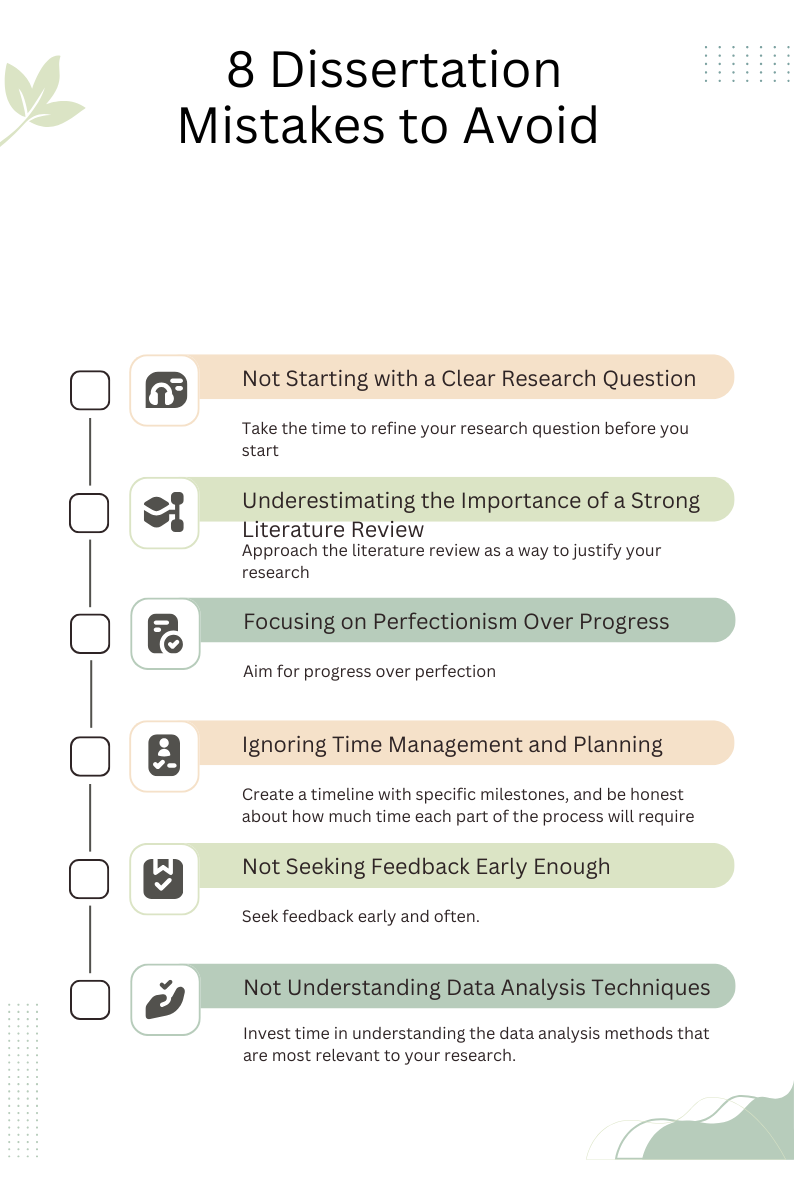Embarking on your dissertation journey can be an exciting yet daunting process. Along the way, it’s easy to stumble into a few common pitfalls that can slow down your progress or lead to unnecessary stress. Fortunately, knowing what these mistakes are and how to avoid them can save you time, energy, and peace of mind. In this post, we’ll discuss some of the top mistakes students make during dissertation writing and provide actionable tips on how to steer clear of them.
Mistake 1: Not Starting with a Clear Research Question
One of the biggest mistakes students make is diving into their research without a well-defined question. Without a clear focus, it’s easy to get lost in the literature or spend time on aspects that aren’t directly relevant to your research goals.
Solution: Take the time to refine your research question before you start. Your question should be specific, measurable, and achievable. If you’re unsure about how to narrow it down, working with a dissertation coach or seeking feedback from your advisor can be helpful. Remember, a clear question acts as a compass that guides the entire project.
Mistake 2: Underestimating the Importance of a Strong Literature Review
A literature review isn’t just a summary of sources—it’s a critical foundation that supports your research. Some students overlook the importance of analyzing the literature and instead compile a list of summaries. This can weaken your dissertation’s credibility and depth.
Solution: Approach the literature review as a way to justify your research. Identify themes, gaps, and connections within the existing literature. Think critically about how each source contributes to your research question. Taking the time to analyse and synthesise will give your dissertation a stronger foundation and make your argument more compelling.

Mistake 3: Focusing on Perfectionism Over Progress
It’s natural to want your dissertation to be well-written and meticulously researched, but perfectionism can sometimes become a barrier. Students who focus too much on perfecting each sentence or section can end up procrastinating or slowing down their progress.
Solution: Aim for progress over perfection. Set realistic goals and keep moving forward, even if parts of your draft aren’t perfect. Remember that revisions are a part of the process. Try setting deadlines for each chapter and avoid getting too caught up in minute details until the revision stage.
Mistake 4: Ignoring Time Management and Planning
Time management is crucial when working on a dissertation, but many students underestimate how long each part will take. Without a clear timeline, it’s easy to fall behind, especially with other commitments like work or classes.
Solution: Create a timeline with specific milestones, and be honest about how much time each part of the process will require. Break down your dissertation into smaller, manageable tasks and set deadlines for each. A dissertation coach can be especially helpful here, as they provide accountability and help you stay on track.
Mistake 5: Not Seeking Feedback Early Enough
Some students wait until they have a full draft before seeking feedback from advisors or peers. This can lead to bigger issues down the line, as large-scale revisions may be needed if foundational issues arise.
Solution: Seek feedback early and often. Even if you only have a rough draft of a section, sharing it with a trusted advisor, peer, or coach can provide valuable insights and help you identify issues before they snowball. Early feedback can help you refine your work and build confidence in your direction.
Mistake 6: Not Understanding Data Analysis Techniques
Data analysis can be complex, especially if you’re new to it. Some students make the mistake of using methods they don’t fully understand, leading to inaccurate results or misinterpretations that can weaken their findings.
Solution: Invest time in understanding the data analysis methods that are most relevant to your research. If you need help, don’t hesitate to reach out to a coach, mentor, or statistical advisor who can guide you through the process. Correct analysis is critical to the integrity of your dissertation, so take the time to get it right.
Mistake 7: Neglecting to Back Up Your Work Regularly
It may sound obvious, but many students have faced setbacks because they didn’t back up their work. A lost draft or corrupted file can be devastating, especially when deadlines are approaching.
Solution: Set up automatic backups using cloud storage services like Google Drive, Dropbox, or OneDrive. Make it a habit to save your work regularly, and keep a copy of your dissertation on multiple devices to ensure it’s safe.
Mistake 8: Overlooking the Importance of Revision and Proofreading
After months of writing, it’s easy to overlook the importance of revising and proofreading your dissertation. However, small errors or inconsistencies can affect the overall quality and professionalism of your work.
Solution: Schedule time specifically for revisions and proofreading. Go through your dissertation with fresh eyes, ideally after a short break, to catch errors and polish your writing. Consider asking a peer, advisor, or coach to review your work for additional feedback.
How a Dissertation Coach Can Help You Avoid These Mistakes
A dissertation coach can provide valuable support at every stage, from setting a strong foundation to refining your final draft. With personalized guidance and accountability, a coach can help you navigate the common pitfalls and stay on track to complete your dissertation successfully.
Coaching can provide you with strategies to improve your time management, refine your research question, and guide you through complex challenges. If you’re feeling overwhelmed or unsure about any part of the process, having an expert by your side can make a world of difference.
Final Thoughts
Avoiding these common dissertation mistakes can save you time, reduce stress, and help you produce a stronger, more polished final product. Remember, every step you take is a step closer to finishing. By approaching your dissertation with a clear plan, seeking feedback, and focusing on progress, you’ll set yourself up for success.